Is Writing a Book Profitable? What to Expect As a First Time Author

When you buy something through one of the links on our site, we may earn an affiliate commission.
Is writing a book profitable?
There isn't really a yes or no answer to this question because it depends. Ultimately, yes, it can be. Just look at best-selling authors JK Rowling or Stephen King. But at the same time, lots of authors don't make enough to quit their jobs, and some even end up losing money.
If you're looking to write your first book with no experience, here's what you can expect as a first-time author and some ways you can maximize your profits when you publish a book.
Contents
Traditional vs Self-Publishing
The first thing to consider if you are looking to publish your book is whether or not to pursue a traditional publishing route or to self-publish.
This will play a big part in answering the question: is writing a book profitable?
Traditionally published authors go through agents. Those agents then find a publisher that is interested in the book. Traditional publishing houses will print, market, and distribute the books plus provide a team of professionals to help with things like editing and cover design.
There are pros and cons to this, but the main thing to highlight is that traditionally published authors usually receive a book advance. However, they also relinquish some control over their story and cover.
Traditional publishing is:
- Hard to get into: Getting a contract with a traditional publisher if you are a new author is no easy feat. Publishers are interested in books with mass market appeal and a proven fan base to write for.
- Slow: The entire process of publishing a book can take two to three years.
- More credible/prestigious: Traditionally published authors are often viewed as more "credible" because their books tend to be more visible and win awards or recognition.
In contrast, self-published authors are responsible for their book from start to finish. They need to take on the printing, marketing, and distribution costs themselves. The upside of this is that they retain control over the whole process and are rewarded with higher royalties.
Self-publishing:
- Low entry barriers: Anyone can self-publish a book. You don't need to prove anything to anyone before you can print books. All you do is just press publish.
- Requires a broader skill set: You are responsible for the entire process of publishing, plus marketing your book. You have to be an editor, a cover designer, a publisher, and a marketer all in one.
- Smaller audience: Without a dedicated marketing team and the resources that many publishers have at their disposal, a self-published book will undoubtedly have lesser reach than a traditionally published one. This means your book will likely reach a smaller audience, which could mean you have less opportunity to sell more copies.
Salary
An author's salary is essentially the sum of all their income streams related to their writing. Self-published authors don't earn a "salary" so much as they earn higher royalties from book sales.
Comparatively, many publishers in the traditional industry will offer an advance ahead of actually selling books.
For new authors without an established audience, this amount will likely be quite small. Think no more than $10,000.
In general, if you can prove that you have readers that are already interested in what you're writing, you are more likely to be awarded a larger advance. If you can incite a bidding war for your book among traditional publishing houses, you can do even better.
Self-published authors don't get to count on an advance to sustain them while they focus on writing, but that doesn't mean they can't earn just as much or more money than traditionally published authors.
An author's salary depends on:
- Number of book sales
- Size of audience
- Royalty rates
- Marketing scope
- Additional revenue streams
It's also worth noting that traditionally published authors go through an agent. Often you don't have to pay your literary agent until you've started selling books, but once you do, they'll get a cut. Most authors end up paying 10-15% of what they earn to their agent.
Book Royalties
The most common form of income for an author is royalties received on book sales. This is essentially a percentage of every book sold that comes back to you. The reason you don't make 100% of the money that someone pays to buy your book is to cover the cost of printing, storing, advertising costs, or marketing the book in the first place.
Royalties are where self-published authors have the opportunity to make more money than they would have if they had opted for traditional publishers.
The average royalty rate for traditionally published authors is 5-7% on paperback and hardcovers and up to 25% for ebooks. Plus, keep in mind that you will have to pay back your advance before you actually start earning royalties. So, if you were awarded a $10,000 advance to write your book, you won't see your royalties until you've earned $10,000 to pay back to your publishing house.
On the other hand, self published authors can generally expect a royalty rate of around 70% on every copy sold. And since you didn't get an advance, you don't have to pay anything back—you start earning right away (learn more about how much an author makes here).
Other
Generally, new authors aren't going to be making a million dollars from book sales in their first year. In order to make a steady income, many authors will rely on building up other income streams that go hand in hand with their writing.
One way that less famous writers have been able to make money while writing is through Patreon. A Patreon account allows your readers to contribute to your writing journey by subscribing to exclusive content.
Other ways that authors can increase their overall earnings are making money through things like:
- Selling book-related merchandise
- Selling exclusive bonus material (think alternate endings, extra chapters, different POV, additional material, etc.)
- A crowdfunding campaign like Kickstarter to raise money
- Some non-fiction writers offer consulting services
- Blogging business
- Courses/workshops related to your books (a nonfiction author can create online or in-person courses or coaching services related to the topic of their book, while fiction writers might think about running something like a “how to write fiction” workshop)
- Speaking engagements
- Merch and product sales (t shirts, etc.)
How Much Do Authors Make?
The truth is most "bestselling authors" are from the traditional publishing industry. This is mainly due to the fact that traditional publishers have a much wider reach when it comes to book sales. Is writing books profitable for everyone?
Authors that have really made a name for themselves in the industry can easily make a full-time living or more by writing. Stephen King, the King of Horror, has a net worth of $500 million. JK Rowling went from being a jobless single mum to a best-selling author with a net worth of $1 billion thanks to her wildly successful Harry Potter series.
Only a fortunate few get big breaks from traditional publishing companies (unless you start your own publishing company ;), enabling them to make a living from writing fiction. But, let's face it, they're just a small fraction of all the aspiring authors out there trying to pursue their craft. Achieving best-seller success in traditional publishing usually requires years of hard work and a sprinkle of luck.
The truth is, your average author makes much less.
According to Indeed, the average salary for a novelist was $49,046 in 2021. But the amount that authors made varied from $10k or less to $150k or more.
The question "How much do authors make" is tricky to answer. It's impossible to pinpoint an exact salary range for an author because the potential to earn money is so varied.
So, is writing books profitable? The short answer is yes.
If you're going to self-publish, then the key to making a full-time living writing books is to have multiple books, an active fan base or niche audience, and some idea of how to market.
Is Writing a Book Profitable If You Self-Publish?
There are plenty of successful authors that have self-published. In fact, for aspiring authors, this means more control and greater rewards. The downside is simply that it also means more work.
If you want to make money by self-publishing your book, the best thing you can do is research and prepare. Upskill in areas you may need to work on. Try this helpful Kindle Launch class on Udemy which walks you through how to launch and market your book.
How to Get Your First Book Ready
The first step to making money as a bestselling author is to actually get your book ready to print. For many authors, it's easy enough to write books, but researching and formatting can be daunting.
Traditional publishing houses have a team of people to help you with these things, but a self-published author will need to work them out.
As publishing books on your own has become more popular, so have the tools that help you save time and produce a professional product.
In order to make the most money when publishing books, here are some of the software and apps to consider to help you.
Keyword Research
To be a successful author, any professional writer will tell you that research is important. This is especially true if you are writing non fiction, but even if you are writing fiction, you need to make sure there's demand from readers for your book idea if you're to make money.
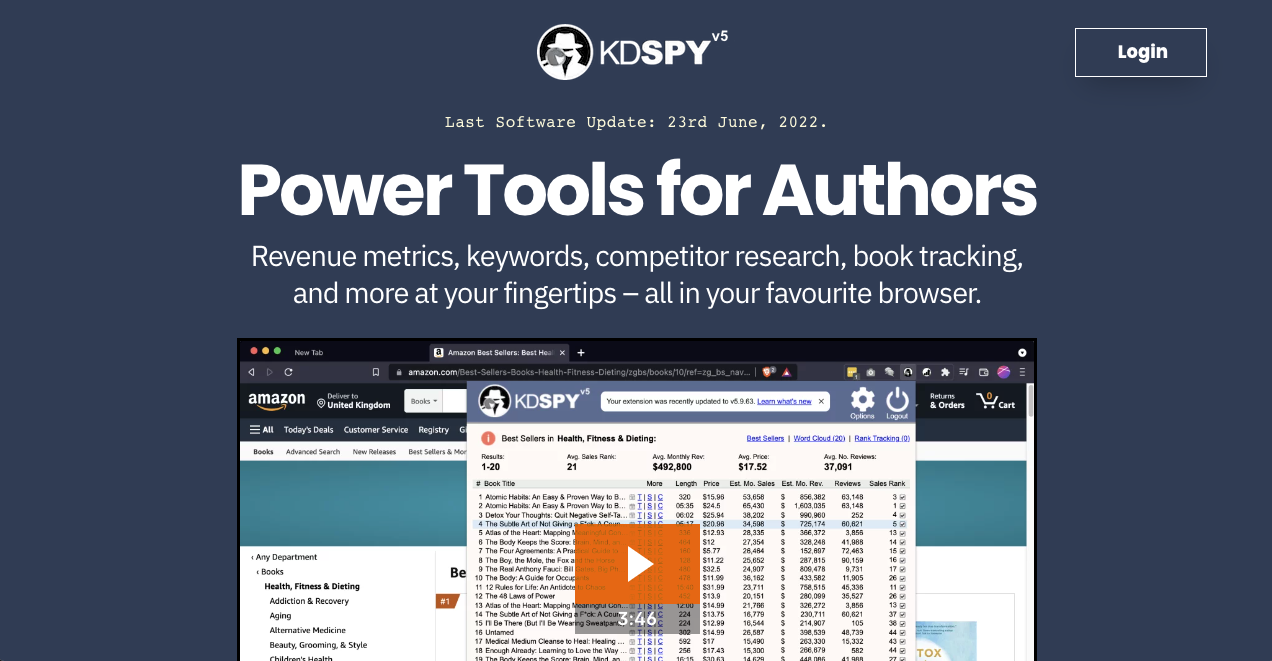
Keyword research to determine what the market is missing and what there is a demand for is critical. KDSpy is designed to make this part of the process easier.
You can read our full KDSpy review.
Formatting and Research
Along the same lines, Book Bolt is half research assistant, half formatting helper. With Book Bolt, you can perform keyword research and also take advantage of templates to get your book ready for print.
For more, read our full Book Bolt review.
And of course Publisher Rocket is another tried and true research software for an aspiring author.
To learn more about this software, read our full Publisher Rocket review.
To find out more about self publishing, I recommend you check out our chat with self-publishing guru Chandler Bolt, who not only published seven of his own bestsellers but is also the founder of Self-Publishing School and the creator of Book Bolt.
How to Publish with Amazon KDP
Now that you've decided on your book and you've written it and formatted it correctly, it's time to publish.
One of the most common platforms that authors have used to publish books is Amazon Kindle Direct Publishing. The benefit is that you get to take advantage of Amazon's existing user base, which means you have a massive built-in audience.
In my opinion, this is the closest you get to matching the reach of the traditional publishing industry.
Here are some of the benefits of self-publishing your book through Amazon KDP:
- Free to use
- Built-in tools like Kindle Cover Creator
- Fast—you can publish right now, today, this very minute
- Kindle Unlimited means you gain exposure to thousands of KU subscribers
- SEO friendly platform
- Flexibility to make changes to the cover or content easily
Plus, when you publish through KDP, then Amazon handles:
- Printing
- Distribution
- Customer service
This means you can spend more time and energy writing. Hooray!
In addition, publishing through Amazon KDP is really straightforward.
Step 1. Sign-in/Create a KDP Account
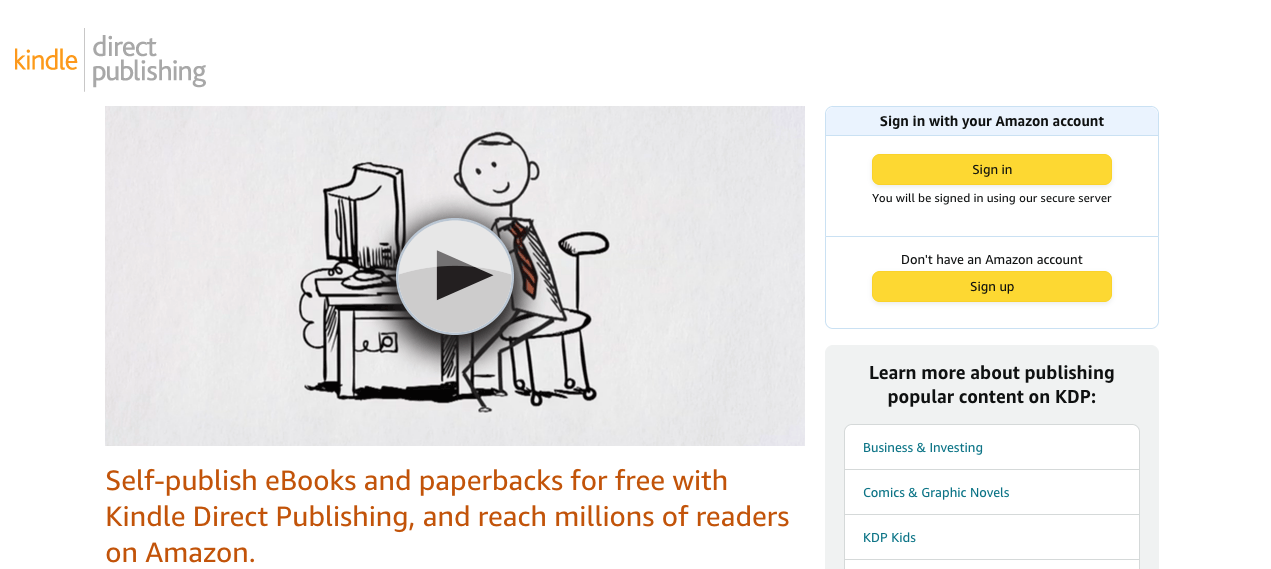
If you already have an Amazon account, you can sign into KDP using those credentials. Otherwise, you can create a new account.
Step 2. "Create Book"
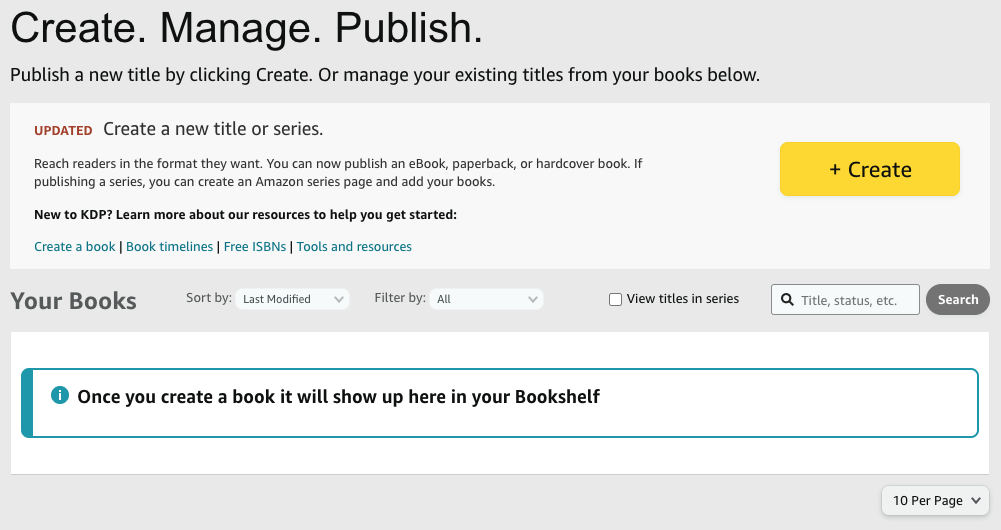
Once you click "+Create" you'll have the option of specifying whether you want to create a paperback, hardcover, or eBook.
Whichever option you choose Amazon makes your book available on a global scale which means you can buy it from anywhere in the world where Amazon exists.
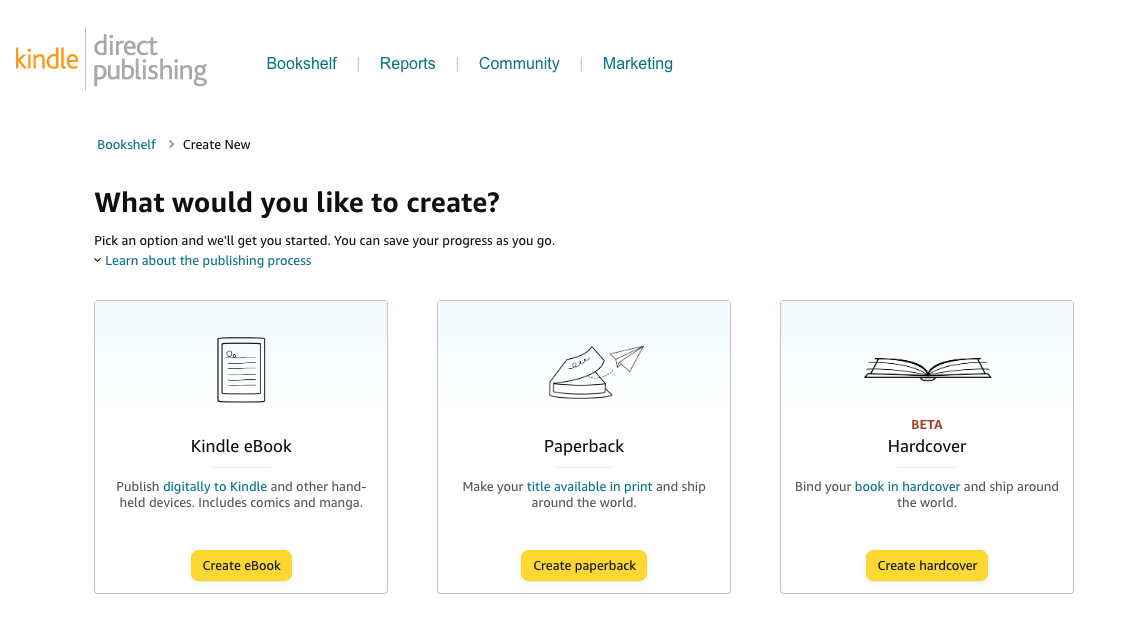
If we select "paperback," then we are brought to the next step of the process, which is filling out all the information about our book.
This is where you can put in your book title, author info, and description. This is also where you will specify your genre, keywords, and whether or not your book contains adult content.
In order to publish through KDP you must own the copyright and necessary publishing rights to the work.
Step 3. Upload Your Manuscript and Book Cover
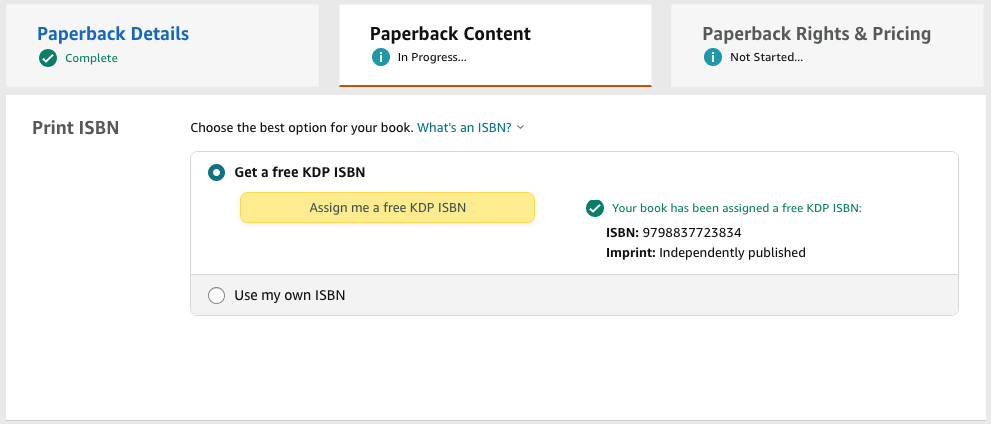
Next, you can get a free ISBN number with KDP. Then pick your print options (color, trim size, bleed, finish, etc.).
Upload your paperback manuscript and your book cover.
An appealing book cover is really important for attracting sales. Many authors will look for a cover designer to help create the perfect image that will mean more books sold.
Once you've previewed your book and you're happy with it, you can move on to the next step.
Step 4. Set a Price and Publish
This is where you decide what price your book retails at. Pricing your book just right can make the difference between ten books sold and a hundred. Take a look at other books in your genre and get a sense of what readers are willing to pay. You can always experiment with different price points. The Amazon KDP agreement provides authors with royalties ranging from 35% to 70% of the cover price for each copy sold.
Once you've decided on the price of your book and confirmed the publishing rights, that's it. You're all set. Congratulations on becoming a published author!
Something worth considering is that when you publish through Amazon and enroll in the KDP Select program, you agree to sell your book exclusively on Amazon for at least 90 days. That means you can't sell your book anywhere else, either in physical stores or other online retailers.
Other Platforms For Self Publishing
If, for whatever reason, KDP isn't for you—or if you decide to launch your book on KDP and then look for other platforms after 90 days—here are some alternatives to check out to make money with your book.
It's always worth it to try and list your book for sale in as many places as possible to reach more readers. If you become a self-published author through KDP, then I'd still recommend publishing through another platform after 90 days.
Is writing a book profitable? If you have your book available in multiple places, you have a better chance of success at turning a profit.
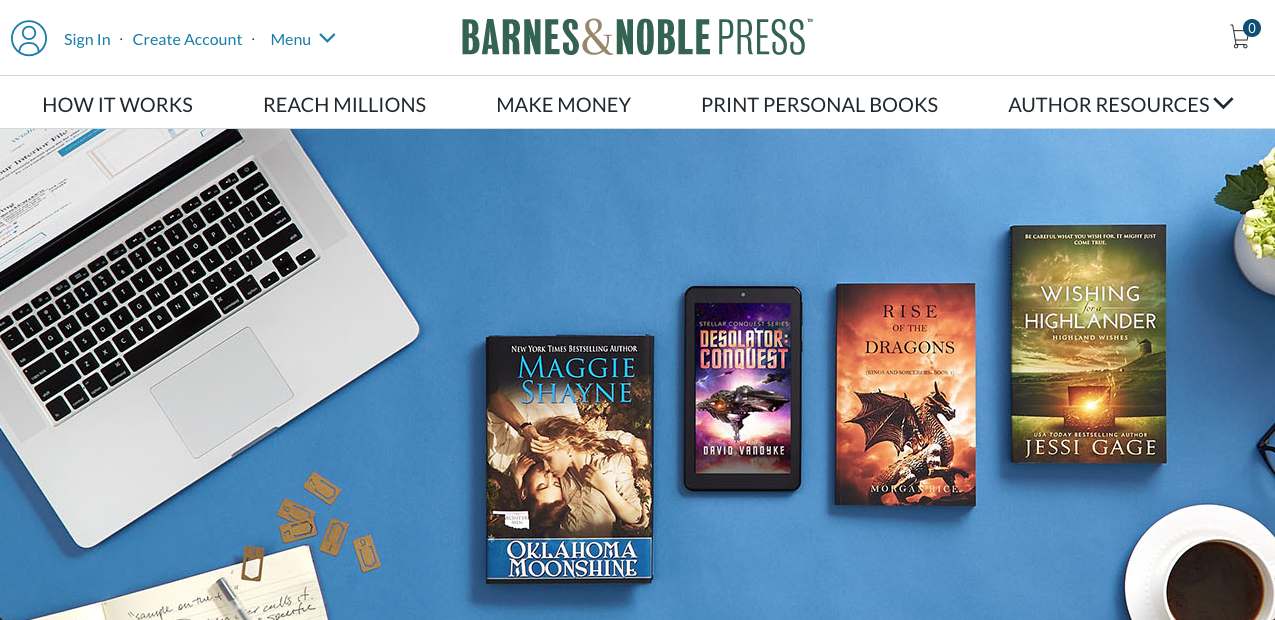
Barnes & Noble Press is probably the second most popular publishing platform for aspiring authors. Royalty rates range from around 40-65% depending on the price of your book, and you gain access to a host of partnered programs for editing services, designing your cover, and marketing solutions.
Another platform worth looking at is Apple Books For Authors. Publishing with Apple is free, and you're guaranteed 70% royalties. With Apple, your book becomes available through iBooks which is the second largest ebook seller right after Amazon, so you've got a good audience base.
If everything about publishing a book yourself just seems like too much, there are still options. Self-publishing companies like Mindstir Media help new authors by taking care of things like ISBN assignment, cover design, barcode, copyright, etc. They also offer a marketing service to help you make money with your own books.
If you need help to become a self-published author, read our Mindstir Media review here.
How to Make Money: Is Writing a Book Profitable?
Write to Market
We've already touched on the importance of keyword research before you start writing. This is especially true for nonfiction books, but even if you are writing fiction, you need to make sure there is a market for the book you want to write.
Remember when Twilight came out, and then suddenly, there was a whole host of other vampire novels hitting the shelves? It's because people were hungry for vampire stories. The demand was there in the market, with lots of people excited about the genre, and plenty of successful authors were only too happy to oblige.
Research your the market and your audience to see if there is space for what you want to write and readers who would buy your book.
Publish a Series

Another key to making money as a self-published author is to simply have multiple books available for purchase. The more books you have published, the higher chance you have of book sales and the more likely you are to make money. When it comes to fiction, an approach would be to write a book series with a main character that keeps readers coming back for more. It's all about making readers eager to dive into the story again and again!
It's pretty simple.
You can also look at how to sell short stories on Amazon as a way to keep your momentum going if you aren't able to write quickly enough to put out multiple books in a row.
Promote on Social Media
The hardest part for most self-published authors is marketing their books. It's not enough to just write it. You need to sell it too in order to make money.
Promoting on social media is the best way to increase your own visibility and gain some traction (and we made a list of the best social media platforms for authors here). Network with other authors in your genre and promote each other's work. Look for book reviewers and readers to connect with and grow your audience.
Start a Blog
Is writing a book profitable? It can be if you take advantage of other online tools to market your book. Another great way to attract attention for your book and ultimately make more money is to start a blog.
You can promote your own book on your author website and even have links to purchase. Meanwhile, you can drive traffic to your blog by posting about topics related to the genre your book is in.
Not only is it a good exercise to keep your writing sharp, but you can also attract a wider audience for your book and gain more readers and a loyal following for your future releases.
Plus, if you're originally self-published but decide to later look for a traditional publishing deal, having a blog with decent monthly traffic can help indicate a following to the publishing houses and increase your chances of a bidding war for a better advance.
Conclusion
Is writing a book profitable? Yes.
If you want to make money writing books, then you need to start treating writing like your full-time job. A lot of work goes into becoming a successful author, especially if you want to self-publish, as you'll be responsible for everything yourself.
The good news is there are lots of places to turn to for support and helpful tools you can take advantage of in order to start making a living writing.
The benefit of self-publishing is that you get to retain creative control and enjoy greater royalties once you start selling.
Plus, all you need is a couple of book concepts, and a laptop to get your writing career started.
If you want to jump-start the process with a step-by-step blueprint, check out Self Publishing School by Chandler Bolt for an actionable plan.
Want to learn step-by-step how I built my Niche Site Empire up to a full-time income?
Yes! I Love to Learn
Learn How I Built My Niche Site Empire to a Full-time Income
- How to Pick the Right Keywords at the START, and avoid the losers
- How to Scale and Outsource 90% of the Work, Allowing Your Empire to GROW Without You
- How to Build a Site That Gets REAL TRAFFIC FROM GOOGLE (every. single. day.)
- Subscribe to the Niche Pursuits Newsletter delivered with value 3X per week
My top recommendations



















